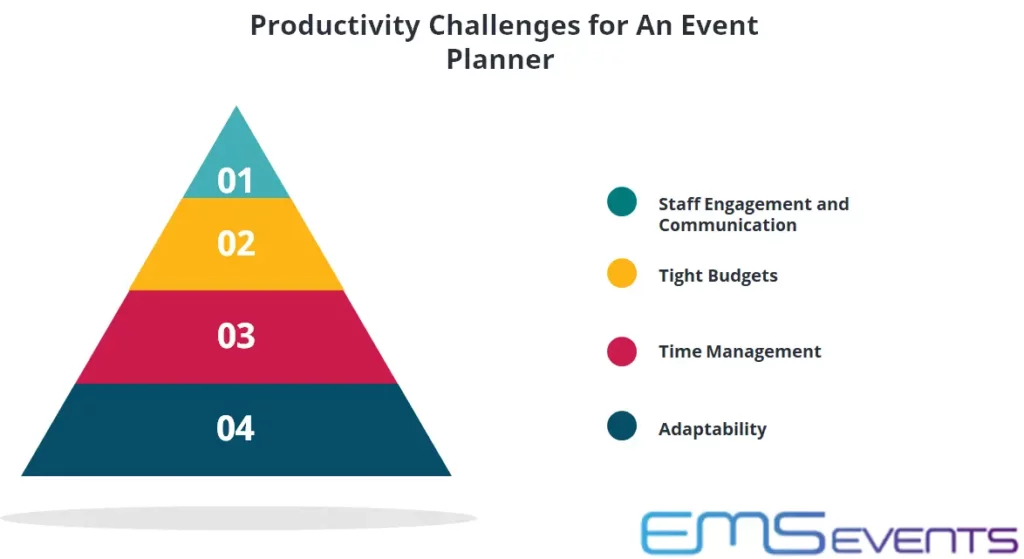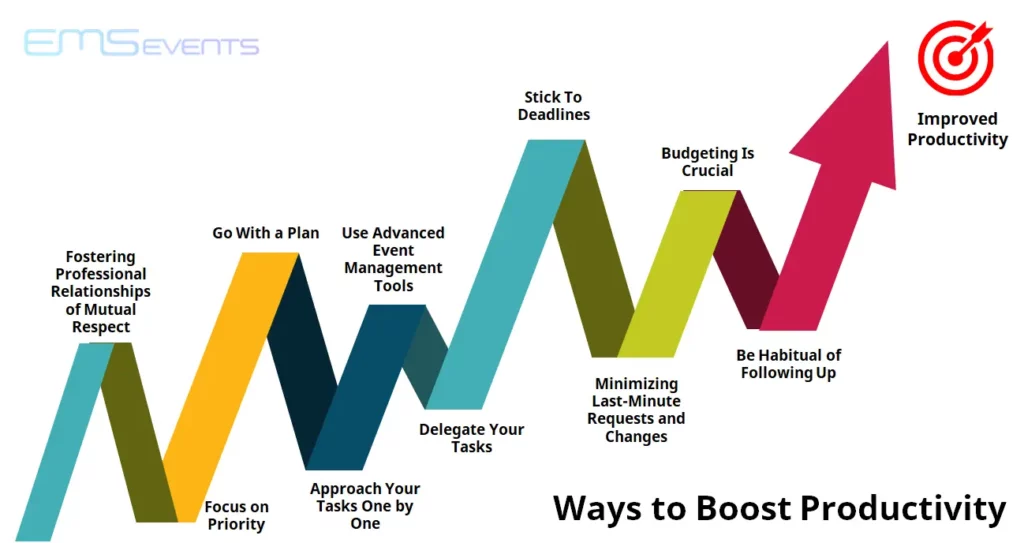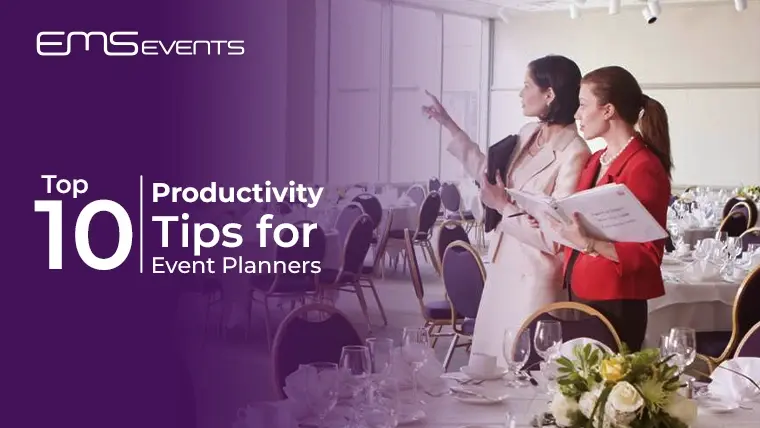Planners’ productivity is always the key to the success of an event. Those who lack productivity cannot survive for so long in the event management industry. The more productive event planners will be, the more successful and memorable events they will organize.
If you are one of the event planners facing a lack of productivity, here we are discussing what aspects hurt an event planner’s productivity and the top 10 fruitful and practical tips to boost it. Adopting these tricks in your event management practices can help you boost your productivity and ensure making every event a success.
Productivity Challenges for Event Planners

Productivity challenges are always there for event planners when it comes to producing the best events. They mainly distract them from the event plan and cause less productivity in the event planning and management team. A few of the critical ones are as follows;
Staff Engagement and Communication
One of the critical challenges for an event planner is to cope with the communication gap between the team and event owners to keep things clear for all. This also causes inefficient staff engagement, which leads to trouble achieving the team’s goals.
That is why; if you are working as an event manager or planner, you must have excellent communication skills. It will not just help you communicate everything clearly with your team, but it will also enable you to communicate effectively with your clients. This will allow you to get maximum productivity from your staff.
Tight Budgets
Working within a tight budget is one of the key challenges event planners face more frequently. Creating a memorable and impactful event while staying within the client’s financial limitations can be difficult.
Planners must have strong negotiation skills and be resourceful to find creative solutions that can help them stay within the budget without compromising the quality of the event.
Time Management
Event planning is one of the time taking and effortful tasks. It is easy to get overwhelmed and lose track of time when juggling multiple tasks, such as vendor management, client communication, and logistics coordination.
Event planners must prioritize tasks, set realistic deadlines, and effectively manage their time to ensure everything is completed on time.
Adaptability
Despite the flawless event planning, you cannot overrule any potential issue that can arise during the event. Event planners must be able to adapt to changes quickly and efficiently, whether it be a sudden weather change or a vendor dropping out at the last minute.
They must proactively detect potential issues and have emergency plans to minimalize the impact of unpredicted situations.
10 Productivity Boosting Tips for Event Planners

As an event planner, are you facing productivity challenges? You must look for ways to improve your team’s productivity level to provide exceptional event planning and management services. In this regard, here are 10 of the top tips that can help you boost your productivity level.
1. Fostering Professional Relationships of Mutual Respect
Building and maintaining strong professional relationships is essential for event planners. It can help work together with vendors, clients, and other stakeholders involved in the event. By fostering mutual respect, event planners can enhance communication, streamline processes, and achieve better results.
2. Focus On Priority
Event planners should be prioritizing their tasks following their importance and urgency level. When you avoid setting priorities, you might be wasting your energy on the less important task and can miss out on the essential ones.
Setting priorities and staying focused on them helps avoid distractions and complete the most critical tasks first, leading to efficient use of time.
3. Go With a Plan
It is imperative to have a plan in place before starting an event planning project. A plan helps in organizing tasks and ensuring that all requirements are met. It also helps in avoiding last-minute confusion and stress.
4. Approach Your Tasks One by One
Event planners should approach their tasks one by one to avoid feeling inundated. Breaking down tasks into minor and handy chunks makes it easier to complete them on time and with high quality.
5. Use Advanced Event Management Tools
Utilizing advanced event management tools such as project management software, online calendars, and mobile apps can help event planners streamline their workflow, keep track of their progress, and enhance communication.
6. Delegate Your Tasks
Workload distribution among the team is always helpful in getting the tasks done efficiently and productively. Therefore, delegating tasks to team members, interns, or vendors can help improve your team’s overall productivity and get things done within the given amount of time.
7. Stick To Deadlines
Adhering to deadlines is crucial in event planning. Therefore, event planners should keep track of their deadlines and prioritize their tasks to ensure everything is completed on time.
8. Minimizing Last-minute Requests and Changes
Last-minute requests and changes can be stressful and time-consuming. Event planners should try to minimize such requests by setting clear expectations, communicating effectively, and informing clients about changes.
9. Budgeting Is Crucial
Proper budgeting is essential for event planning. Event planners should set a realistic budget and monitor expenses to avoid overspending. This always helps in better event management despite budget tightness.
10. Be Habitual of Following Up
Following up with clients, vendors, and stakeholders is essential to ensure everything is on track. Event planners should be habitual in following up and maintaining open communication to avoid any miscommunication or delays.
Departing Words
Being productive is what always helps you achieve your goals. And when it is specific to event management, the need to be productive becomes undeniable. In this field, you cannot effectively fulfill your client’s requirements if you lack productivity and proficiency in your event planning and management team.
The above discussion can help you improve your productivity and stay ahead of your competitors in the market. However, if you feel you cannot accomplish effective event planning and management goals on your own, you can hire a professional team from EMS Events.
Frequently Asked Questions
What Are 3 Key Challenges for an Event Planner?
As an event planner, you may face multiple challenges, including unclarity about the available budget, insufficient crew, and poor time management. These three are quite critical challenges to be considered when it comes to making an event a success.
How Much I Have to Pay to Hire an Event Planner?
The costs of hiring an event planner or an event management company always depend on an event’s scope, nature, and requirements. So, the best practice is to consult the respective service provider beforehand to negotiate prices for managing an event.
How Early Should I Hire an Event Planning and Management Company?
Considering the scope and nature of the event you want to organize; it may vary from months to years to hire event planning and management service providers before the event.
If your event is small, it may take one or two months to plan and manage the whole event for your hired service providers. However, you must take an event management company on board for at least 6 months before the event date for bigger events.
